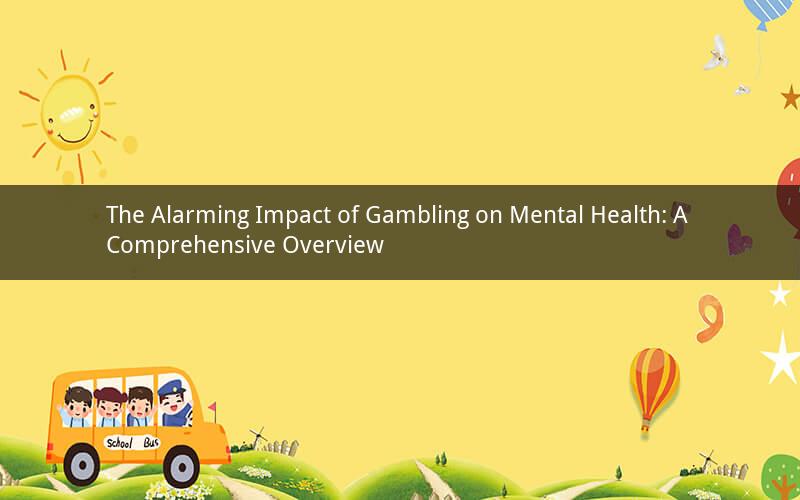
Introduction:
Gambling has long been a popular form of entertainment for many individuals. However, it is crucial to understand the detrimental effects it can have on mental health. This article explores how gambling can impact individuals' psychological well-being, highlighting the potential consequences and offering strategies for prevention and support.
I. Understanding the Link Between Gambling and Mental Health
1. The Definition of Problem Gambling:
Problem gambling, also known as gambling disorder, is characterized by an uncontrollable urge to gamble, despite negative consequences. It is a significant public health concern and can lead to various mental health issues.
2. The Psychological Effects of Gambling:
a. Anxiety and Stress:
Gambling can trigger feelings of anxiety and stress, as individuals often become fixated on the desire to win and relieve their financial worries.
b. Depression:
Continuous losses and the pressure to sustain gambling activities can lead to feelings of depression, as individuals may experience hopelessness and a lack of motivation.
c. Impulse Control Issues:
Gambling often involves making impulsive decisions, which can exacerbate existing psychological disorders such as attention-deficit/hyperactivity disorder (ADHD) and bipolar disorder.
3. Cognitive Impairment:
Gambling can impair cognitive functions, including memory, attention, and decision-making abilities. This can further contribute to mental health issues, as individuals may struggle to maintain their daily responsibilities and relationships.
II. The Social Consequences of Gambling-Related Mental Health Issues
1. Family and Relationships:
Problem gambling can strain relationships, as individuals may become distant, irritable, and secretive. It can also lead to financial problems, which can put a significant burden on family members.
2. Employment and Productivity:
Gambling-related mental health issues can significantly impact an individual's ability to perform their job effectively. It may result in decreased productivity, absenteeism, and even job loss.
3. Suicidal Thoughts and Behavior:
Problem gambling is associated with an increased risk of suicidal thoughts and behaviors. The constant struggle to overcome financial losses and the pressure to maintain gambling activities can push individuals to the brink of despair.
III. Prevention and Support Strategies
1. Early Intervention:
Identifying and addressing gambling-related mental health issues at an early stage is crucial. Individuals who exhibit signs of problem gambling should seek professional help immediately.
2. Support Groups:
Support groups, such as Gamblers Anonymous, provide a safe and supportive environment for individuals to share their experiences, learn coping strategies, and connect with others facing similar challenges.
3. Therapy and Counseling:
Therapy, such as cognitive-behavioral therapy (CBT), can help individuals develop healthier gambling behaviors and address underlying mental health issues.
4. Education and Awareness:
Educating individuals about the risks of gambling and its potential impact on mental health is essential in preventing problem gambling.
5. Responsible Gambling:
Promoting responsible gambling practices, such as setting limits, taking breaks, and seeking help when needed, can help mitigate the negative consequences of gambling.
Conclusion:
Gambling can have a profound impact on an individual's mental health, leading to a range of psychological, social, and economic consequences. It is crucial to recognize the signs of problem gambling and seek support to address these issues. By implementing prevention and support strategies, we can help individuals maintain their mental well-being and break the cycle of gambling-related problems.
Questions and Answers:
1. Q: Can problem gambling be treated effectively?
A: Yes, problem gambling can be effectively treated through various methods, including therapy, support groups, and lifestyle changes.
2. Q: How can I recognize if someone is struggling with problem gambling?
A: Signs of problem gambling include increased time spent on gambling, neglecting responsibilities, secrecy regarding gambling activities, and experiencing negative consequences as a result of gambling.
3. Q: Are there any genetic factors that contribute to problem gambling?
A: Yes, research suggests that genetics play a role in the predisposition to problem gambling. Individuals with a family history of gambling-related issues may be at a higher risk.
4. Q: Can gambling-related mental health issues lead to substance abuse?
A: Yes, there is a significant association between gambling-related mental health issues and substance abuse. Both conditions can exacerbate each other's symptoms.
5. Q: What can be done to promote responsible gambling practices?
A: Responsible gambling practices can be promoted through education, setting limits, seeking help when needed, and implementing measures to prevent excessive gambling, such as self-exclusion programs.